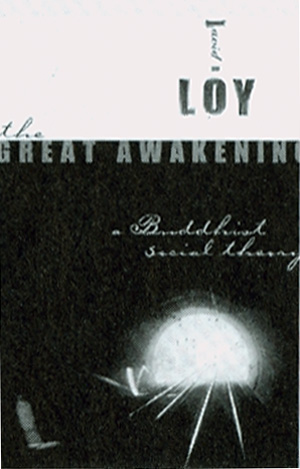 The Great Awakening: A Buddhist Social Theory
The Great Awakening: A Buddhist Social Theory
David R. Loy
Boston: Wisdom Publications, 2003
223 pp.; $16.95 (paper)
Buddhist economics? When the term was coined in 1973 by the British economist E. F. (“Fritz”) Schumacher, it sounded like an oxymoron. Why would mainstream economists be interested in something so fanciful? Why would Buddhists be interested in something so divorced from spiritual practice? The answer, according to a group of writers who are shaping the nascent field of Buddhist social thought, is the same: to reduce suffering. “The economic process begins with want, continues with choice, and ends with satisfaction, all of which are functions of the mind,” the Thai scholar-monk Phra Payutto has observed. So, would deeper understanding of the mind yield wiser, more compassionate forms of social organization? Could a Buddhist economics really work?
David Loy ponders such questions in The Great Awakening: A Buddhist Social Theory, with fruitful results. Loy, a professor of international studies at Bunkyo University in Japan, shows that Buddhist social theory is neither wishful thinking nor a mechanical exercise in trying to match past teachings to present problems. In this new kind of social thought, which Loy represents, inner work and work in the world are one and the same.
Buddhists seeking to fathom suffering today face a daunting array of problems and fields. “If we do not try to understand the larger historical forces moving the world today, we accede to them,” Loy asserts. Especially in light of September 11, we recognize that the social causes and effects of suffering have never been more complex. Loy devotes a chapter to the aftermath of the terrorist attacks, and other sections (presumably drafted before September 11) have added resonance in the post-September 11 world. When he writes, for example, of “our vindictive attitude toward offenders, who must be punished because, unlike us, ‘they’ are guilty,” he is referring to the criminal justice system, but he could just as easily have been commenting on recent American foreign policy. Such features make The Great Awakeningarguably the most extensive Buddhist response to September 11 published to date.
As Loy points out, ancient Buddhist teachings on the “three poisons” help to illuminate contemporary behavior. Our national obsession with economic growth is a kind of collective greed; the war on terror and the invasion of Iraq exemplify institutionalized anger; and the environmental crisis—rooted in a rupture of humanity’s connectedness with nature—is a sign of mass delusion. In a grim reversal, delusive passions become a surrogate for religion. “If religion teaches us what is really important . . . the most important religion for an increasing number of people all over the world is consumerism,” Loy observes.
Last March, on the first day of the Iraq war, the Thai activist Sulak Sivaraksa gave a talk in Rochester, New York. One audience member voiced the quandary of many Buddhists: “I’m a Zen practitioner, and I’m active in the Buddhist Peace Fellowship. But with this horrible war upon us, I just don’t know what to do. What is right action in this situation?” Sivaraksa replied, “Right action comes out of right view.”
Loy and other Buddhist social thinkers would agree. Engagement is essential, but we need to know what we’re doing. In medicine, an effective cure begins with an accurate diagnosis. In Buddhism, release from suffering (dukkha) begins with clear-eyed discernment of conditioned existence. Loy writes:
From a Buddhist perspective, the most fundamental problem with present social arrangements is that they do not really make people happy—even those who benefit the most—because they are based on a defective premise, a wrong understanding of how dukkha may be ended.
Prevailing notions of wealth, poverty, and development are socially constructed and must be radically rethought, Loy contends. “There is a greater need for the Buddhist insight that economics and technology cannot by themselves resolve our dukkha.”
The questions Loy asks are timely: Is Buddhism compatible with capitalism? In a Buddhist-inspired society, how would crime and punishment be handled? Is nondual social theory possible? Can corporations become enlightened? His thoughtful answers draw on promising ideas already in circulation: Restrict advertising; give communities the power to revoke corporate charters; democratize international markets. But he compels us to view them from a fresh perspective. We are unaccustomed, for example, to a Buddhist take on the structural adjustment plans of the World Bank and the International Monetary Fund. Several of Loy’s inventive phrases invite further contemplation: “the collective wego-self,” “the religion of the market,” “a grassroots transformation of consciousness.”
Together with Ken Jones’s The New Social Face of Buddhism: A Call to Action, published by Wisdom earlier this year [see review in Tricycle, Summer 2003], Loy’s book offers a formidable critique of Western social thought. The Great Awakening is a bold title. Most Buddhists associate the phrase with Shakyamuni’s incomparable enlightenment. I admire Loy’s chutzpah in applying it here. In this time of great peril and great promise, “awakening”—personal awakening, social awakening, ecological awakening—is exactly what we need to relieve widespread suffering. We could even, in honor of E. F. Schumacher, call it Fritz’s Law: Awakening is the most economical way to save the world.